
Cosmetic | Consumer Research
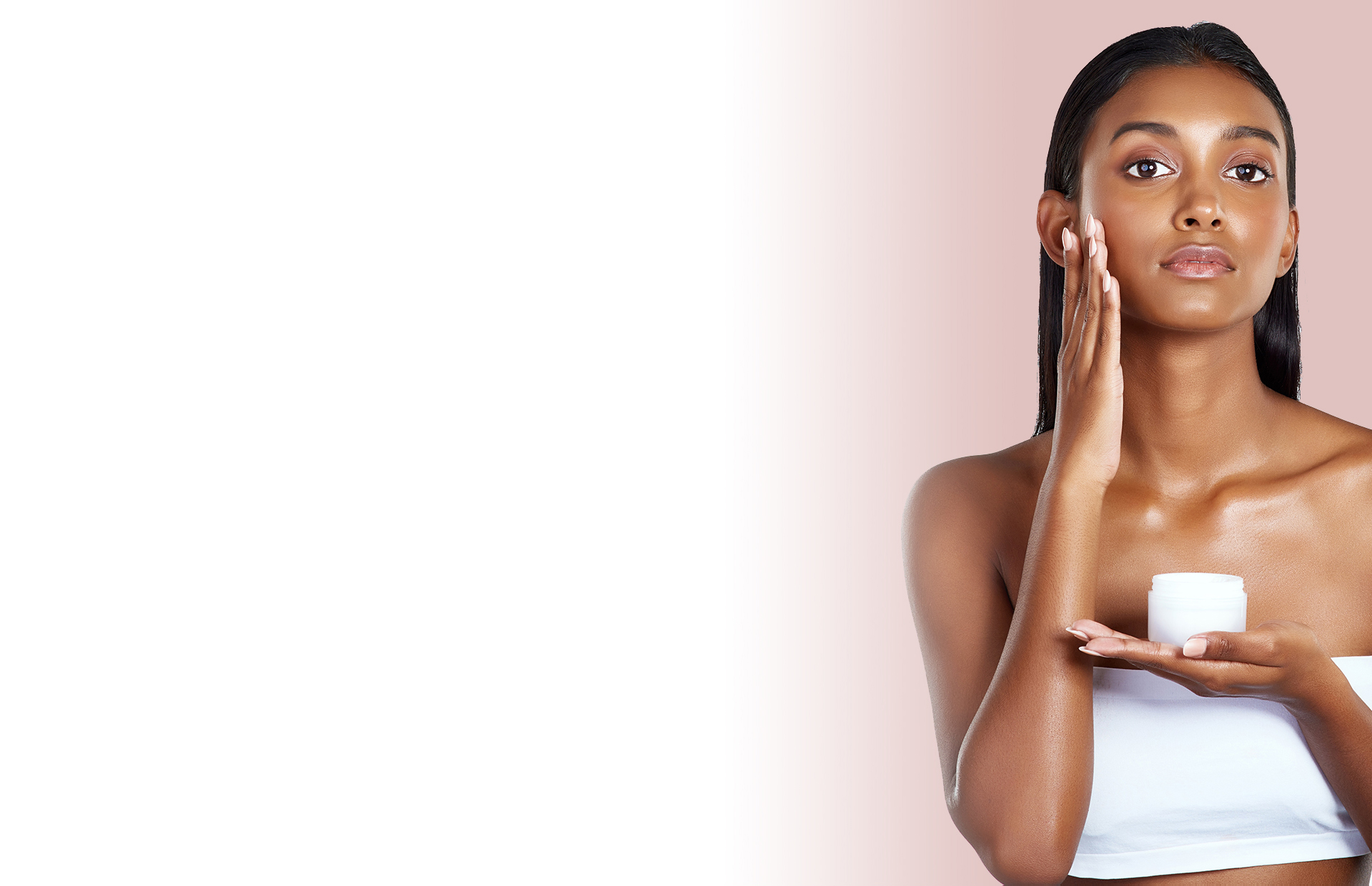
Safety | Tolerance
-
Safety and skin compatibility of cosmetic and personal care products are rigorously assessed through Primary Irritation Patch Testing (PIPT), Cumulative Irritation Patch Testing (CIPT), and Human Repeat Insult Patch Testing (HRIPT). These studies evaluate the potential for skin irritation, sensitivity, and long-term dermal compatibility under repeated or prolonged use. All tests are conducted in controlled clinical environments and adhere to the guidelines set by BIS, COLIPA (Cosmetics Europe), and other international regulatory standards. The results provide robust scientific evidence to support product safety claims such as “dermatologically tested”, “Safe on skin” and “non-irritant,” helping brands build consumer trust and meet global compliance requirements.
-
-
24-/48-/72- hours Primary Irritation Patch Testing (Dermal Safety Testing)
-
7/14/21-Days Cumulative Irritation Patch Testing
-
Human Repeat Insult Patch Testing (HRIPT) or Irritation/Sensitization (I/S) Study
-
-
Patch Testing Photographs
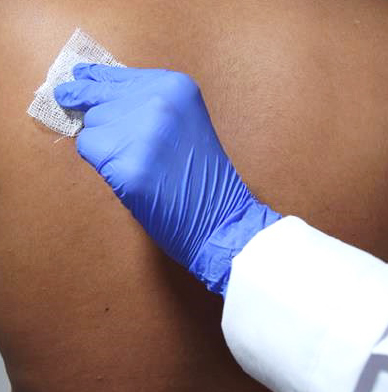
Site Cleaning
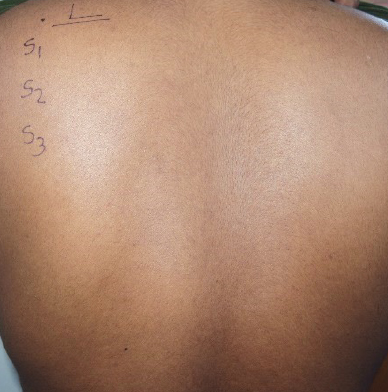
Site Marking
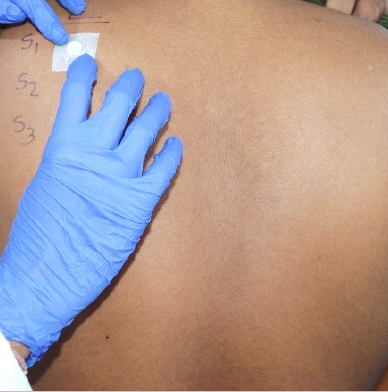
Patch Application
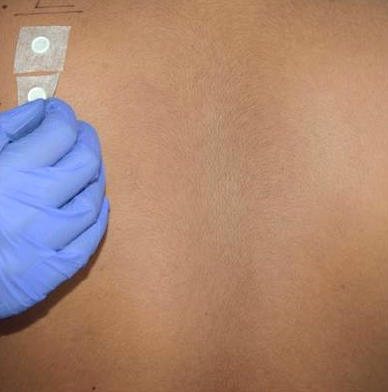
Patch Removal
-
Photoallergy | Photosensitization
The potential of cosmetic and personal care products to cause adverse skin reactions under light exposure is carefully evaluated through photoallergy and photosensitization studies. These assessments determine whether a formulation may trigger irritation, allergic responses, or sensitivity when exposed to UV or visible light. All studies are performed in controlled clinical environments and in strict accordance with BIS, COLIPA (Cosmetics Europe), and international regulatory standards. The outcomes provide robust scientific evidence to ensure product safety, strengthen consumer protection, and support global compliance requirements.
-
Direct Eye Instillation | Eye Sting
Ocular tolerance is a critical parameter in the safety evaluation of cosmetic and personal care products that may come into contact with the eyes. Direct Eye Instillation studies are designed to systematically assess the potential of formulations to induce stinging, irritation, or discomfort. These evaluations are particularly relevant for eye-targeted and face-related products, including eye creams, eyeliners, mascaras, makeup removers, facial cleansers, and shampoos.
-
Non-Comedogenicity
Non-comedogenicity testing plays a vital role in assessing whether cosmetic and skincare products may block pores or contribute to the formation of comedones (blackheads and whiteheads). This evaluation is especially critical for formulations developed for acne-prone or sensitive skin, such as moisturizers, sunscreens, foundations, and facial oils. Studies evaluations are conducted by trained dermatologists through clinical grading and bio-instrumental measurements.
-
Non-Acnegencity
We conduct non-acnegenic studies to evaluate skin condition pre- and post-product application over a one-month period. Expert evaluators quantify acne lesions, including papules and pustules, across the forehead, cheeks, and chin. These assessments provide robust, evidence-based data to confirm formulation safety for acne-prone skin, supporting product development and regulatory compliance.

Clinical Safety In-Use and Efficacy Studies
Comprehensive clinical safety in-use and efficacy studies evaluate product performance under real-world conditions. Trained clinicians monitor safety parameters and assess key efficacy endpoints to generate robust, data-driven insights. These studies ensure formulations meet the highest standards of safety, effectiveness, and regulatory compliance, supporting evidence-based product development.
Non-Acnegencity
-
Clinically validated endpoints and scoring systems
-
Instrument-based measurements
-
Subject and investigator global assessments
-
Comparative and placebo-controlled evaluations

Consumer In-Sights
Consumer insight studies are designed to generate real-world data on product usage, perception, and efficacy. These services support brands and developers in aligning formulations with user expectations, validating claims, and enhancing product positioning
-
Online | Remote Evaluation
Facilitates systematic assessment of product performance and consumer experience through digital and remote platforms, enabling scalable, geographically unrestricted, and real-time data acquisition.
-
Data Collection on Beauty Routine
Comprehensive data collection services capture detailed insights into daily beauty routines, revealing consumer habits and product usage patterns. These insights help understand how skincare, haircare, and cosmetic products are incorporated into everyday regimens, aiding product development and targeted marketing efforts.
-
Scaled Efficacy Test
Employs standardized, reproducible methodologies to quantitatively evaluate multiple product performance parameters, generating robust, evidence-based insights for formulation validation.
-
Simple Monadic Test
Enables controlled evaluation of single-product performance on consumers, isolating product-specific effects and ensuring reliable, scientifically validated efficacy assessment.

Market Survey
Designs and executes structured market surveys to capture comprehensive insights on consumer preferences, product usage patterns, and emerging trends. Leveraging data-driven methodologies and expert analysis, these surveys provide actionable intelligence to guide strategic product development, positioning, and business decision-making.

Organoleptic | Product Sensory Evaluations
Rigorously controlled organoleptic and product sensory evaluations are delivered as part of in vivo testing services, quantifying sensory attributes using trained panels and standardized methodologies. These evaluations support claim substantiation, regulatory compliance, quality assurance, and product optimization across dermatological, cosmetic, nutraceutical, OTC, and personal care products.
Assessment:
-
Appearance
-
Odor/Aroma
-
Taste/Flavor
-
Texture/ Mouthfeel
-
Touch/Skin feel
-
Cooling/warming effect